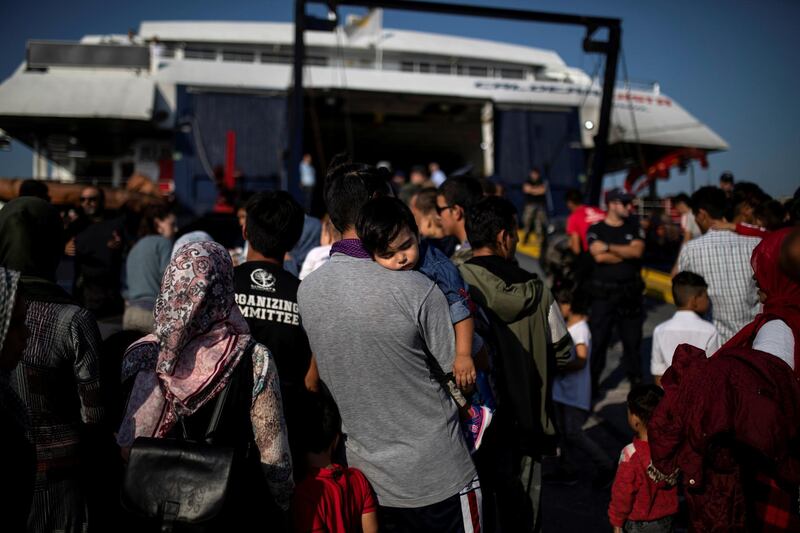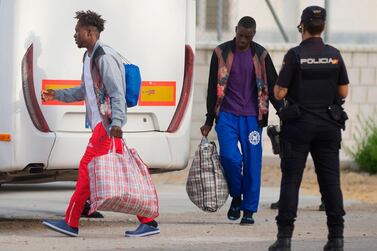Authorities in Greece have scaled up deportations of migrants amid a raft of new steps to counter a rising influx of people arriving on their shores.
The Greek government announced a series of emergency measures on Monday, aimed at tackling a resurgence in the flow of migrants from neighbouring Turkey.
The plans include increasing the number of border patrols, speeding up the deportations of illegal migrants back to Turkey, and moving asylum seekers from island camps to the mainland.
The move came as a weeks-long crisis in Italy took a new twist with two migrant rescue ships landing at ports in Sicily and Lampedusa to disembark those onboard.
The German ship Eleonore on Monday entered the Sicilian port of Pozzallo, Sicily, with over 100 migrants on board.
The Italian organisation Mediterranea Saving Humans said its Mare Jonio ship would also be allowed to land 31 people it had rescued fleeing north Africa.
The new measures introduced by the Greek authorities and the ongoing disputes between the Italian interior ministry and international NGOs conducting search and rescue missions have helped spark fears of a return to the migrant crisis of 2015.
Michalis Chrysochoidis, civil protection minister for the new government in Athens, described “huge waves” of migrants arriving on Greek shores.
“If the situation were to continue, we’d have a repeat of 2015,” Mr Chrysochoidis said after the new measures were announced.
Authorities of Greece’s new centre-right government have begun transporting about 1,500 migrants from the eastern Aegean island of Lesbos to centres on the mainland.
A ship carrying 635 people set sail from Lesbos on Monday morning for the northern port city of Thessaloniki.
From there, authorities said the asylum seekers would be transported to a camp in Nea Kavala in northern Greece.
A second ship carrying around 900 people left Lesbos for Thessaloniki on Monday afternoon.
The transfer was part of decisions made during a national security meeting convened by prime minister Kyriakos Mitsotakis on Saturday, after nearly 600 people arrived on Lesbos in the space of an hour on Thursday.
The national security council meeting also decided to speed up the deportation of those whose asylum applications have been rejected, and to abolish the second-stage review of asylum applications.
The government also announced it would bolster the coast guard fleet with 10 new speedboats, increase border surveillance, and activate a maritime surveillance system.
Hundreds of people continue to head to Greece from Turkey each week, despite a 2016 European Union-Turkey deal that restricts new arrivals to the islands pending deportation unless they are successful in their asylum application.
The EU-Turkey deal and the backlog of asylum cases has led to a large bottleneck on the eastern Aegean islands, where asylum-seekers are housed in massively overcrowded.
In general, only those deemed to be in vulnerable groups, such as the elderly, very young and people with serious health problems are eligible for rehousing on the mainland.
Official figures released on Friday showed that more than 10,000 people were being held in Lesbos in a facility with a capacity of 3,000, while there was also severe overcrowding on the islands of Chios, Leros, Kos and Samos.
Italy's outgoing interior minister Matteo Salvini has vowed to prosecute a charity boat after it entered Italian waters without permission and sailed toward the Sicilian port.
Mission-Lifeline captain Claus-Peter Reisch said bad weather forced him to bring the migrants to Pozzallo's port after they were stranded on board for eight days by the outgoing populist Italian government's crackdown on humanitarian rescue boats.
A decree issued by the Salvini-run Interior Ministry earlier this year established a million-euro fine for captains of rescue boats that defy the ban on entering Italian waters or docking without permission.
The ship had been at sea for eight days waiting for a safe port.
Three charity vessels are currently banned from entering Italian territorial waters in accordance with the hardline policies of the outgoing League-Five Star Movement coalition government.
Italy customs officers seized the Eleonore as part of the recent legislation aimed at curbing the numbers of migrants reaching Italy.
The Mare Jonio rescued 98 people in distress off the coast of Libya last week, with 67 vulnerable people disembarked to Italy, including women, children and urgent medical cases, Faenzi said.
A third vessel, the Alan Kurdi operated by German charity Sea Eye, was on Monday sailing between Malta and Italy after also being banned from Italian waters by outgoing far-right interior minister Matteo Salvini.
Salvini, who is being removed from the government after he tried to bring it down, issued a tough security decree earlier this year which provides for rescue ships to be seized and their captains prosecuted if they enter Italian waters without authorisation.
Prime Minister Giuseppe Conte is in talks to form a new government without Salvini.








